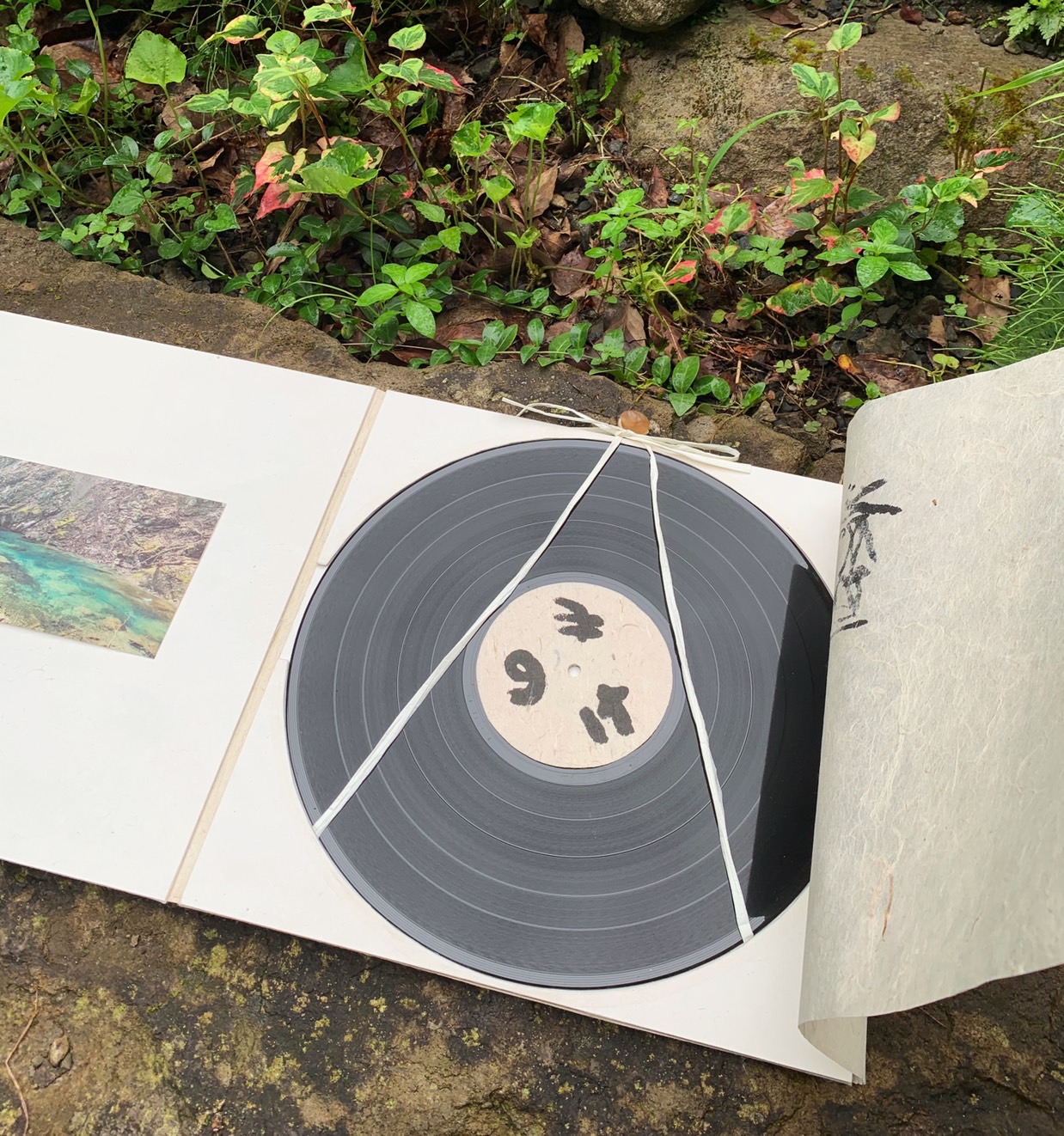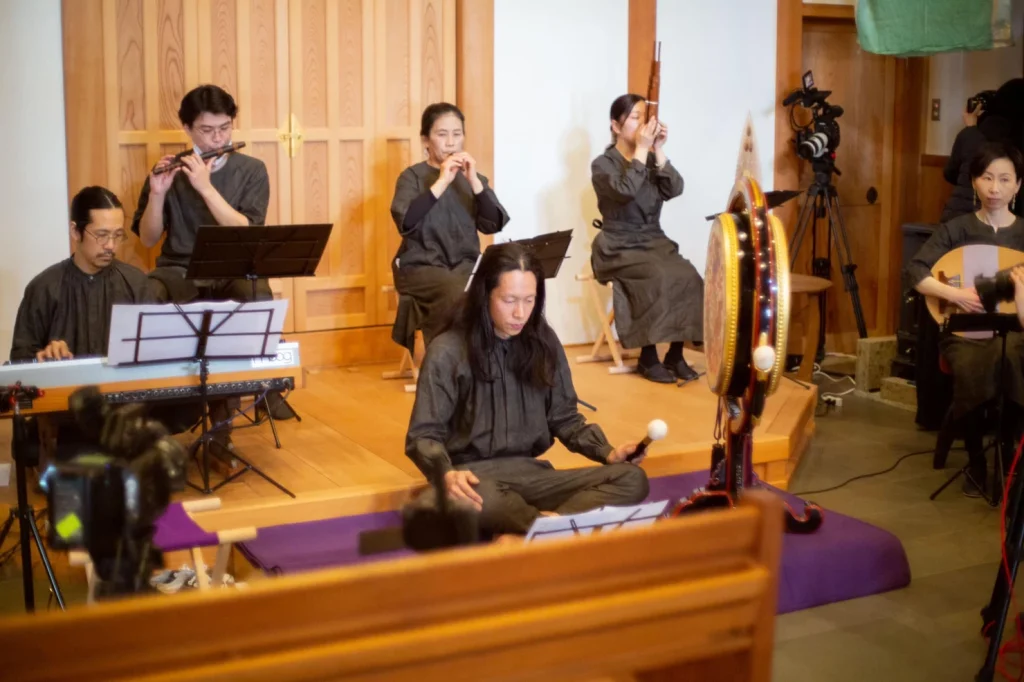

Japanese court music of "Gagaku" project DOMBURAKO 1st album "Kemono"
DOMBURAKO by Taro Ishida and OORUTAICHI started in 2021
The first sound source was released as a special analog record edition.
Please take a look at our approach and thoughts on music production.
Japanese court music of "Gagaku" is a kind of traditional music and considered the oldest orchestra in the world.
Together with this "Gagaku", we "DOMBURAKO" have completed an album.

We recorded outdoors on a lake in Kyoto with four Gagaku players, and each record was recorded directly (direct-to-disc) at a record factory in Osaka.
The jackets are handmade one by one using Washi paper, a traditional Japanese craft.
In addition, the covers and records will be individually painted and lettered in Indian ink by Japanese artists.
Each record is made to order.
The number of pieces that can be produced is limited because it takes so much time and effort to produce.

The four players of Gagaku, Hitomi Nakamura (Hichiriki), Kaoru Nakamura (gaku biwa), Hanako Nakamura (Sho), and Yoshiyuki Izaki (Ryuteki), who are active in both the Reigakusha (a Gagaku group) and individually,have composed and performed new pieces as well as classical Gagaku in various venues.
It is my great fortune to be able to work with people who are masters of their instruments.






In November 2021, an outdoor recording session was held at Sawanoike, Kyoto in Japan.
Gagaku is sometimes performed outdoors at events and ceremonies,
Focusing on the harmony with nature, which is one of the most attractive features of Gagaku, we decided not to record in a studio this time,
We chose to record outdoors.
Sawanoike is a place that Takeshi Azuma, who was in charge of engineering for this project, suggested to me.
The sound echoed off the surface of the pond, melting into the heavens,
It was a very interesting acoustic space, even the echoes bounced off the mountains in the back.
All recordings were made in one shot.
Normally, there would be a process of recording each instrument individually, adjusting the volume and applying sound effects.
This process is called mixing. In this case, the intention was to preserve as much of the signs of the site as possible,
During the recording stage, we took into account the volume and resonance of each instrument while keeping the distance between the player and the microphone.
As the performance began, winds started to blow as if to clap hands, and the change of day from day to evening and other diverse factors affect the performance , The music was infused with a once-in-a-lifetime experience that could only happen on that day.
The video below is a 360° shot of the day's recording session.
Kinomata Valley is located in Itamuro, Nasushiobara City, Tochigi Prefecture.
At this Meikei, known for its beautiful clear water,
We have dedicated a performance to mark the completion of the album.
OORUTAICHI is playing the Koto, Taro Ishida is playing the Gong, and
Yuuki Masiko, who created the jacket for this album, is drawing.
The day's events were filmed,
Entitled "Kemono Tachikitaru",
The performance of "Ama Ranjo" by Yoshiyuki Izaki was added to it,
And we made it into a video work.


The jackets that contain the records were produced using plenty of Karasuyama Washi paper, a traditional craft of Nasukarasuyama that originated in the Nara period.
Washi paper is said to be born where there are mountains and clear water.
Handmade washi paper is made by mixing bark and dead leaves, preserving the natural colors and textures of the paper.
The longer it ages, the more it acquires texture and durability.
It is the perfect material to house the timelessGagaku recordings that DOMBURAKO takes on.
We valued what we saw as we touched the paper a lot to see what kind of design would be best.
The sounds and smells of folding, flipping, and cutting Washi paper with a knife. When Washi paper is layered on other paper, a nebulous light appears through it.
The paper absorbs the moisture of the glue, and the slightly heavy, sagging shape of the paper reveals its color.
The many reactions from the materials were a great guide to the design.
We consider the production process itself to be a part of the work.
The parts are individually cut and lined up so that the paper grain is aligned, and glue is applied horizontally and vertically, and
Applying the paper, folding it in, covering the edges of the material, and so on, is like a ritual,
The process is based on a unique “ways of making (molds)” for this work only.
For the power of the materials to flow as appropriately as possible, as if facing the energy of plants reaching toward heaven and earth, or the flow of energy within living things.
We created it with such a praying heart.

This picture shows the skeleton of the "Kemono".
This is, at the same time, a human figure.
Since human beings are animals by nature,
It is a figure of quiet determination, just before running out of patience with something.
The song "Kemono" evokes an aspect of beast in human will give us hope in this chaotic era as we move toward the next generation.
The jade patterns falling from the heavens, like snow and petals are gently cheering them on.
At the top of the jacket is a soft, light-transparent gobi agate.
Each stone is a natural stone, so the color and shape of each piece is different. We hope you enjoy the encounter with the stones.
All laser prints of the "Kemono" are done by hand, one by one, and the drawings and text are completely one-off, as they are original drawings.
It will be delivered with an edition number.
"Kemono" LP
Size: 310 mm x 310 mm
Materials: Washi paper, natural stones, Indian ink, Hu powder, ink, hemp twine

This time, the record will be engraved with sound vibrations on each disc.
We used the method of Direct cutting.
AUTORA FACTORY PLATE in Osaka was in charge of this process.
The normal production process for records and CDs is based on the assumption that the same product will be produced in large quantities, However, the products produced can result in large quantities of surplus goods remaining in stores and record companies.
Such a situation, where the plastic is turned into garbage that must eventually be discarded, makes the creators feel complicated.
Nowadays, the mainstream form of listening to music is data via the Internet, However, the sound with "substance" when it becomes a record is irreplaceable.
We worked to ensure that we could deliver products produced in a way that we were comfortable with, and without waste.
I have photographed the scene of the Direct cutting of "Kemono". AUTORA FACTORY PLATE
price
$300.00(with Download code)
procedure
(1) Email us your address.
(2) We will inform you of the amount, including shipping costs.
(3) Please pay that amount via Paypal.
(4) After confirming the payment,will send you the download code for the sound source first. And, we will start making the product.
You may have to wait up to two month for the production to be completed.
(5) We will contact you by email when we have shipped the product.
(6) If you find any defects in the arrived goods, please contact us by email.